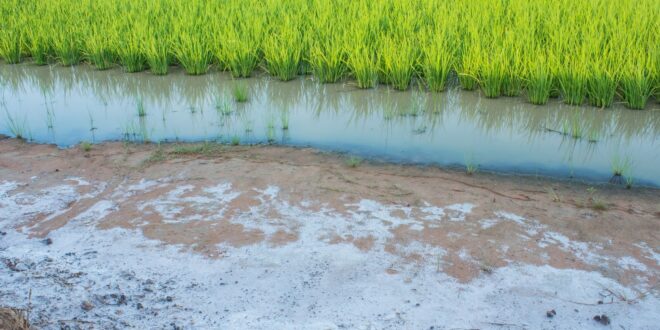By Suri Zheng
Earth’s delicate ecosystems have been significantly impacted by human activities over the centuries, leading to various environmental issues. Among these issues, salinization of the Earth’s air, soil, and freshwater is a growing concern. Salinization refers to the increased concentration of salts in these natural systems, which can have detrimental effects on the environment, human health, and biodiversity. Let’s explore how human activities are contributing to the salinization of Earth’s air, soil, and freshwater and discuss the consequences of these changes.
I. Salinization of the Air
While the concept of salinization is most commonly associated with soil and freshwater, it also has an impact on the air. Human activities contribute to air salinization primarily through the release of salt particles and compounds into the atmosphere. Some significant sources of air salinization include:
1. Road Salt: The widespread use of road salt for de-icing during winter months results in the release of sodium chloride (table salt) into the air. These salt particles can become airborne and contribute to air salinization.
2. Agricultural Practices: Modern agricultural practices often involve the application of fertilizers that contain various salts. Wind erosion and dust storms can transport these salt particles into the atmosphere, leading to air salinization.
3. Industrial Processes: Various industrial activities release salt particles into the air through processes like combustion and the use of certain chemicals.
Air salinization can have adverse effects on human health, leading to respiratory problems and air quality issues. Additionally, it can influence weather patterns and contribute to the formation of acidic rain.
II. Salinization of Soil
Soil salinization is a significant concern, as it affects the quality and productivity of agricultural land. Human activities play a central role in soil salinization through the following mechanisms:
1. Irrigation: In arid and semi-arid regions, excessive irrigation practices can lead to the accumulation of salts in the soil. This is because water evaporates from the soil’s surface, leaving behind salt deposits.
2. Poor Land Management: Deforestation, urbanization, and improper land management can disrupt natural processes that regulate salt levels in the soil, increasing the risk of salinization.
3. Fertilizer Use: The application of chemical fertilizers, which often contain salts, can lead to soil salinization if not managed properly.
4. Saltwater Intrusion: In coastal areas, human activities such as groundwater extraction can cause saltwater to infiltrate freshwater aquifers, leading to soil salinization.
Soil salinization reduces soil fertility, inhibits plant growth, and diminishes crop yields, which can severely affect food security and livelihoods.
III. Salinization of Freshwater
Salinization of freshwater bodies, such as rivers, lakes, and aquifers, is another pressing environmental issue. Human activities contribute to freshwater salinization through various means:
1. Industrial Discharges: Industries often release saline wastewater into nearby freshwater bodies, increasing their salt content.
2. Agricultural Runoff: Irrigation runoff, along with the use of salty fertilizers, can carry salts into freshwater systems.
3. Mining and Construction: Mining and construction activities can disturb underground salt deposits, leading to the leaching of salts into nearby water sources.
4. Climate Change: Altered precipitation patterns and increased temperatures due to climate change can exacerbate freshwater salinization by concentrating salts in smaller volumes of water.
The consequences of freshwater salinization are far-reaching. It can harm aquatic ecosystems, reduce the availability of freshwater for drinking and agriculture, and threaten the health of both aquatic life and humans who depend on these resources.
Human activities have a profound impact on the salinization of Earth’s air, soil, and freshwater. It is crucial to address these issues through sustainable practices, responsible land and water management, and the development of environmentally friendly alternatives. Recognizing the consequences of salinization is the first step towards mitigating its effects and ensuring a healthier, more sustainable planet for future generations.
 Tempus Magazine By Students, For Students
Tempus Magazine By Students, For Students 



